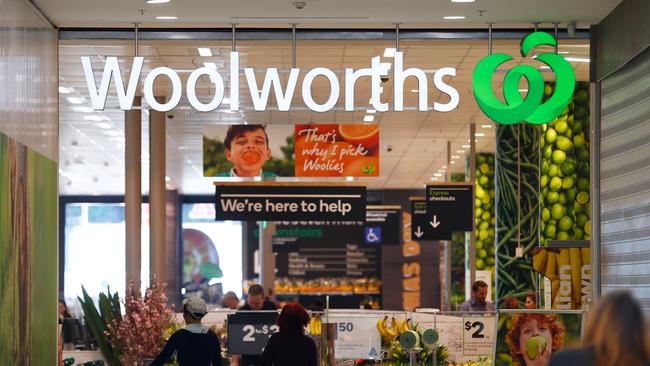Woolies redefines self-service with $300m staff pay rort
Woolworths is the latest major Australian company to have massively underpaid workers.

On August 28, Michael Campbell, head of operations at the Fair Work Ombudsman, received correspondence from Ashurst, the legal firm representing Woolworths. Ashurst told Campbell its client had uncovered “non-compliance” issues with the wages of its workers. It did not disclose the estimated amount owed to employees, let alone hint that the company would soon confess to the biggest underpayment of employees on record.
Campbell shared the news with his boss, Fair Work Ombudsman Sandra Parker. Given the company had lawyered up, Parker, the Coalition-appointed national workplace regulator, suspected the situation was more serious than Ashurst was letting on.
She believed the letter implied Woolworths would tell her the extent of the underpayment before going public. That didn’t happen. On Wednesday Woolworths announced to the Australian stock exchange that an estimated 5700 supermarket employees had been underpaid up to $300m since 2010. The mind-boggling amount floored Parker. Generally cautious with her public commentary, the Ombudsman authorised a statement expressing “shock” that yet another large, publicly listed company had “admitted breaching Australia’s workplace laws on a massive scale”.
READ MORE: Fair Work swamped by wage rip-offs | Woolies staff wait for back pay
| Beyond hopeless: Woolies slammed
Australia’s worker underpayment bill has soared past $500m as Woolworths joins 7-Eleven, Wesfarmers, Super Retail Group, Qantas, Commonwealth Bank, the ABC and many other companies in failing to ensure employees are receiving their lawful entitlements
Parker tells Inquirer that Woolworths’ lack of transparency with her agency is “completely unacceptable”. “I reckon Woolworths would know where every product in its store is, when it runs out, when it needs to be replaced, every widget in that place they would know, yet somehow it’s ‘oh, whoops, we didn’t get the salaries right’,’’ she says. “You hear a lot of these companies say ‘people are our best resource, we care deeply about people’. It doesn’t look like it, does it?”
Attorney-General and Industrial Relations Minister Christian Porter backs the Parker critique, calling Woolworths’ conduct “beyond hopeless”. He says the string of underpayments by companies has convinced the Coalition to legislate to further increase the maximum civil penalties for underpaying employees, as well as criminalising large, repetitive wage underpayments.
“These are large, sophisticated organisations,’’ he told ABC-TV’s 7.30. “They’ve got huge HR teams and tax teams and, honestly, if they have the time and resources to constantly advertise to tell us how awesome they are; if they’ve got the time and resources to get involved in social issues; if they’ve got the time and resources to sponsor sporting teams and have boxes for the best games in town, then they should have the time and resources to pay their staff properly.”
The underpayments at Woolworths have gone on for almost a decade but their exposure was triggered only in February when three night-fill managers complained to management that crew members they supervised to stack shelves were paid more than them. They were employed under non-union contracts on an annualised salary supposedly set at a level designed to cover ordinary hours and reasonable overtime on a typical roster.
Woolworths said this week these managers received an average annual pay of $73,000 but Josh Cullinan, secretary of the Retail and Fast Food Workers Union, says many received less than $65,000. He estimates the average underpayment among the managers to be $50,000.
Cullinan says managers regularly worked 50-60 hours a week, including late nights, early mornings and weekends. Under the award, he says, working those hours would have entitled the managers to up to $80,000 a year.
Managers were supposed to be paid comfortably over the award rate of pay, but the annualised wage did not adequately take into account entitlements such as penalty rates and allowances that kicked in when employees worked late nights and weekends.
Initial analysis of two years of wage records show 5700 out of 11,000 supermarket employees have been underpaid. Woolworths concedes the number of supermarket-affected employees will increase given a further seven years of payroll is yet to be audited.
Analysis also has to be done of the pay of 8000 workers at its other businesses — Big W, Dan Murphy’s and BWS. Cullinan says he expects the underpayments to be a significant issue at Big W. Accusing Woolworths of “crocodile tears”, he says the union has been planning a class action against the company after being contacted by concerned workers, but the self-disclosure on Wednesday “beat us to the punch”.
Tracy Angwin, chief executive of the Australian Payroll Association, says Woolworths is facing an issue that many companies are finding themselves in due to a lack of a regular payroll compliance audits. “The underpayment goes as far back as 2010, which shows a lack of reviewing payroll systems to ensure that employee pay is being calculated correctly,’’ she says. “Often, companies fall into the trap of adopting a set-and-forget mentality to payroll systems, which can lead to major underpayments such as this one.”
ACTU secretary Sally McManus says some of the companies in the hospitality sector involved in the “massive instances of wage theft in recent months have multiple locations in different states, manage the complex logistics involved in supplying fresh food to those businesses, manage rental arrangements, and marketing promotions”.
“We simply don’t believe that it’s beyond the capability of these businesses to pay their workers correctly,’’ she says. “It’s not a question of what businesses can do, but what they think they need to do, and what they think they can get away with. Unfortunately, under the current system many businesses make the calculation that ripping off workers and getting caught will still be cheaper than paying them correctly in the first place.”
University of Adelaide law professor Andrew Stewart says the disclosures may be the “tip of the iceberg”. “The broad reason is the incessant desire to cut costs and that includes not employing specialists,’’ he says.
Stewart says many companies have human resources staff who have generalised expertise rather than a specialist understanding of the intricacies of the award system. “If Woolworths didn’t want to worry about the complexity of award rates of pay, it should simply have ensured the higher salaries were being paid,” he says.
“I completely accept that small businesses have legitimate concerns about the complexity of award rates of pay. I do think more could and should be done to simplify award obligations for smaller businesses but that is no excuse for businesses like Woolworths, Bunnings or the ABC.”
Parker says the Hayne royal commission into banking has provided “an awakening of corporate responsibility” that has run in parallel with media exposure of underpayments and a fed-up community “saying enough”.
She says the regulator’s resources have in the past been primarily focused on small and medium-sized businesses as the number of reported big underpayments by major companies have been less than a handful in recent years. She says there have been 22 separate large underpayments by big companies in 2019 alone. “It’s tipping us into the corporate-regulator space and we have never been in that space before. All these companies are coming forward, with their large underpayments, complex company structures,’’ Parker says.
“We are getting massive self-disclosures … putting us into the realm of being a corporate regulator because the community is expecting us to be satisfied that the company is properly assessing the underpayments. They want us to (take) oversight (of) getting the money back, and making sure it doesn’t happen again. That actually requires a different set of skills in this agency and high-level legal expertise. Companies are coming to us with teams of lawyers. Negotiation skills need to be high and we need forensic accounting expertise.”
Parker says the FWO must review how it operates because the number of large underpayments by major companies was “ramping up”. “There’s a lot more of it. Initially we thought there would be a few … but they just keep coming.’’





To join the conversation, please log in. Don't have an account? Register
Join the conversation, you are commenting as Logout